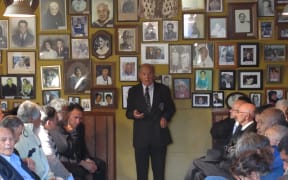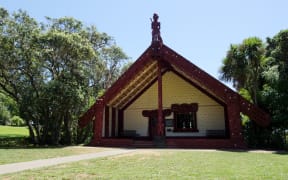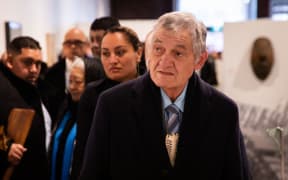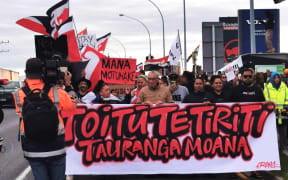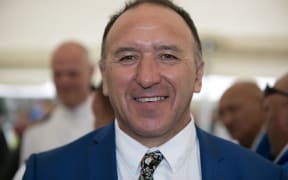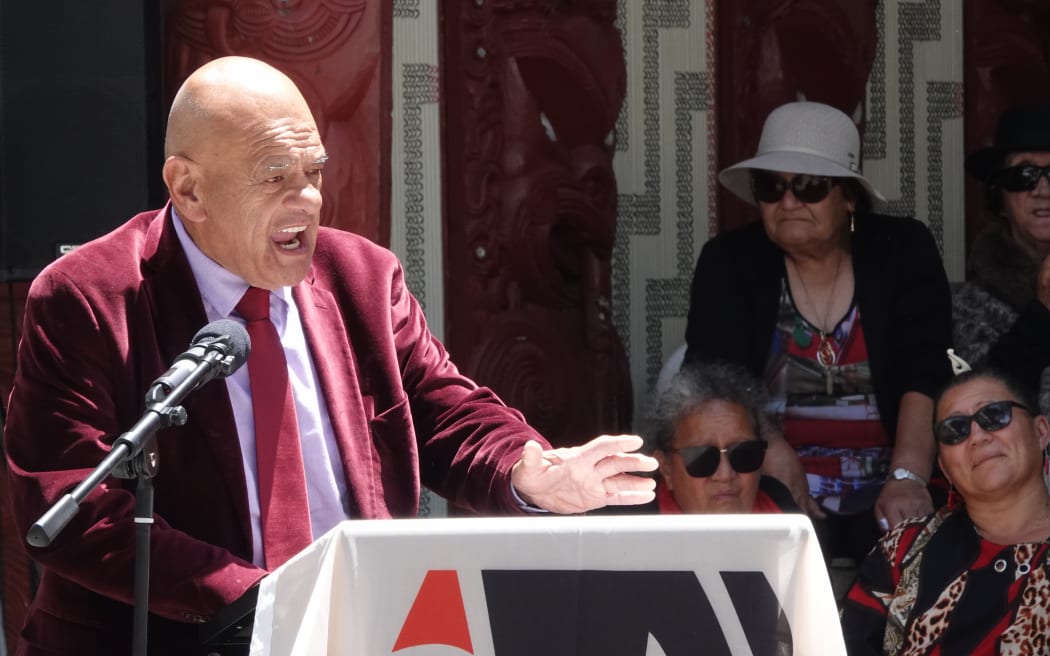
Ngāti Hine leader Waihoroi Shortland addresses the crowd gathered at the Treaty Grounds. Photo: RNZ/ Peter de Graaf
A landmark Waitangi Tribunal report into injustices suffered by Ngāpuhi will strengthen the iwi's case as it looks to restart its stalled Treaty settlement negotiations, a hapū leader says.
Tribunal members travelled to Waitangi on Saturday to hand over the completed part one, stage two Te Paparahi o Te Raki report, also known as the Northern Inquiry.
The report deals with land loss, military conflict and Treaty breaches endured by Ngāpuhi, Northland's biggest iwi, between 1840 and 1900.
Copies of the almost 2000-page document were presented to representatives of each of Ngāpuhi's seven taiwhenua, or hapū groupings, in a sometimes emotional ceremony.
Earlier in the morning, hapū members remembered the many people, both claimants and Tribunal members, involved in the long-running inquiry who did not live to see it completed.
Their photos were displayed on the mahau [porch] of Te Whare Rūnanga, the Treaty Grounds' carved meeting house.
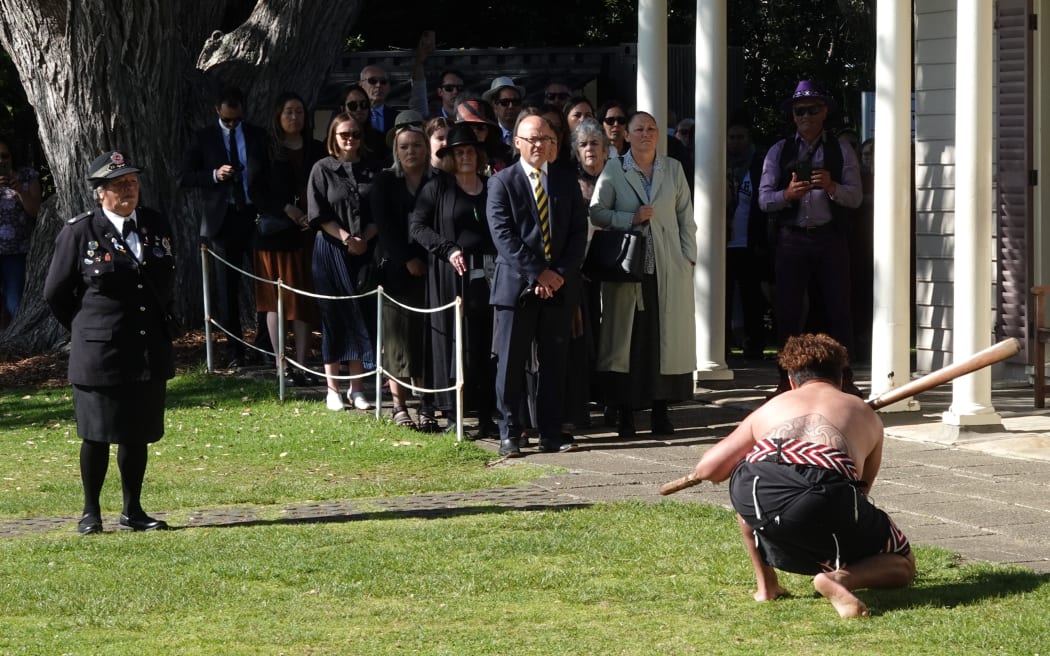
Rehia Rameka issues a challenge to presiding officer Craig Coxhead as members of the Waitangi Tribunal arrive at the Treaty Grounds. Photo: RNZ/ Peter de Graaf
Ngāti Hine chairman Waihoroi Shortland said the report would strengthen the hand of hapū once Treaty settlement negotiations got underway.
"It's a day we have waited a long time for. It's the culmination of all the grievances we brought to the Tribunal over these last 13 years," he said.
"We've waited a long time to see how our claims have been analysed and reflected upon by the Tribunal. Today is the day we pick up the ammunition. It's the day we have a look at what kind of fighting tools we have as we enter negotiations and settlement of our historical claims."
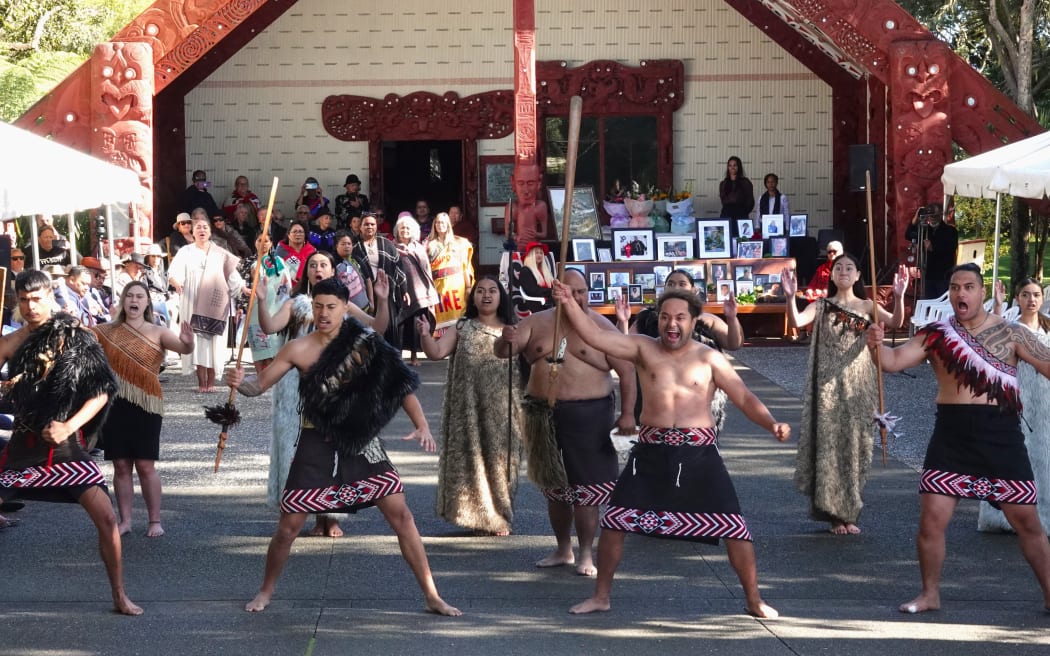
Cultural group Te Pito Whenua performs a haka pōwhiri as members of the Waitangi Tribunal are welcomed onto the Treaty Grounds. Photo: RNZ/ Peter de Graaf
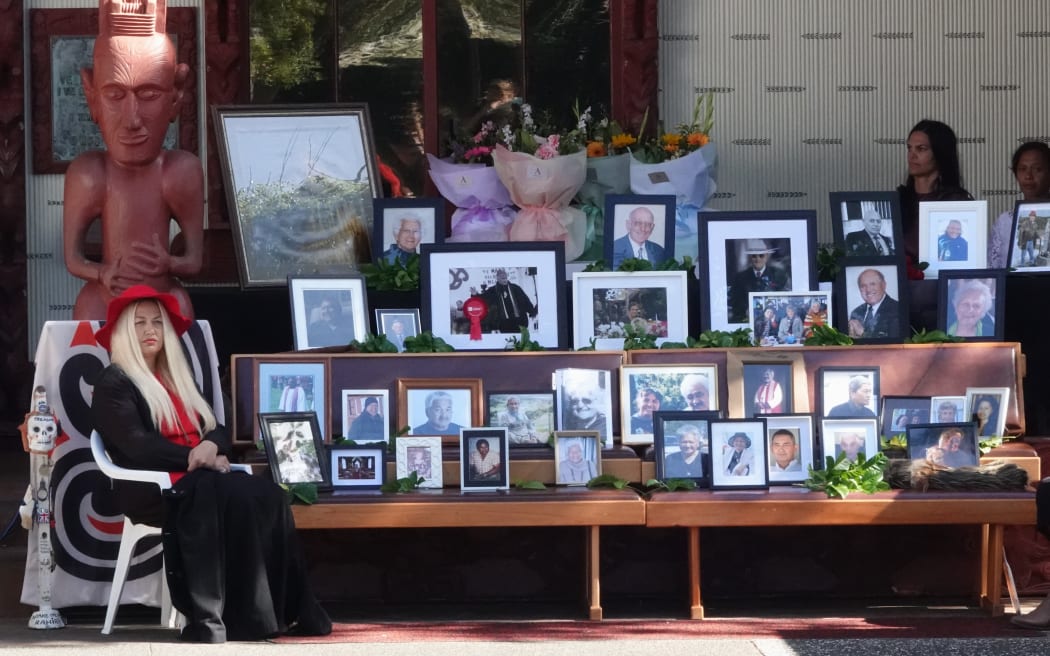
Photos of Tribunal members and claimants who did not live to see the final report are displayed on the porch of Te Whare Rūnanga. Photo: RNZ/ Peter de Graaf
Shortland said he deliberately used the word "historical" because settlement would not necessarily mean an end to Ngāpuhi's claims.
"History tells us that governments, over the past 184 years, have continued to breach the Treaty. They will do it again going forward. They are preparing to do it again right now. We don't want to prolong the agony, but we will not stand aside and be the subject of the agony."
After a rousing welcome for Tribunal members, and before copies of the report were presented to claimant groups, Waitangi Tribunal deputy director Sandra Edmonds read a summary of the findings.
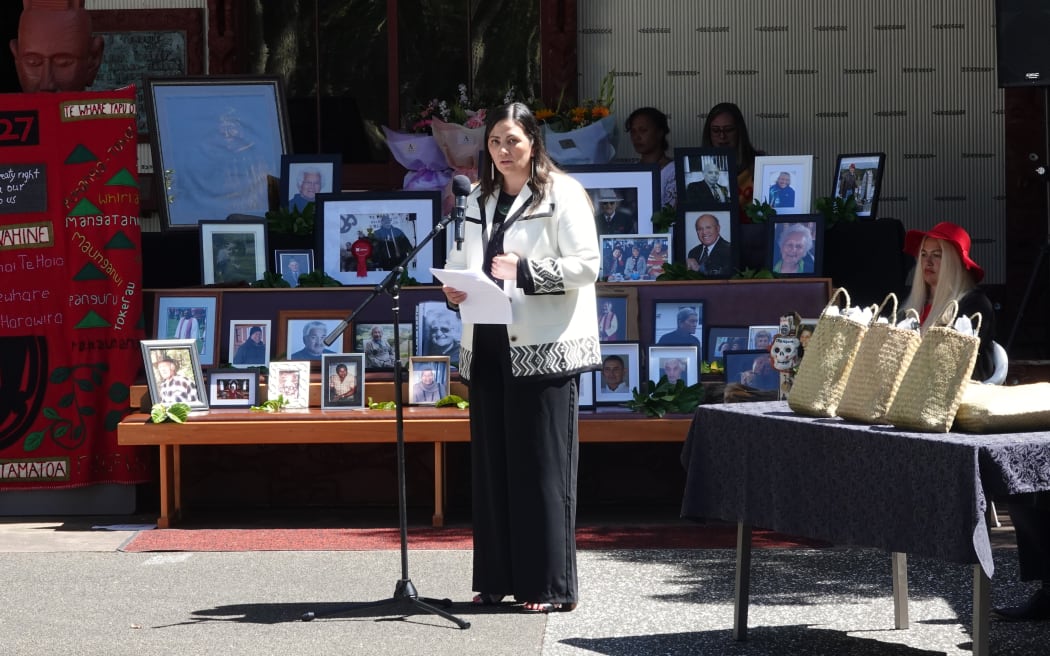
Waitangi Tribunal deputy director Sandra Edmonds reads a summary of the report. Photo: RNZ/ Peter de Graaf
A hush descended on the crowd as she detailed decades of misdeeds by the Crown - such as the so-called Dog Tax War when the government sent an armed force against Hokianga Māori - and listed the Tribunal's key recommendations.
They include an apology from the Crown; the return of all Crown-owned land within the inquiry district to Māori ownership; and "substantial further compensation" to restore the economic base of hapū and make up for economic losses caused by Treaty breaches.
The Tribunal also called on the Crown to enter discussions with Northern Māori to "determine appropriate constitutional processes and institutions at national, iwi and hapū levels" to give effect to their Treaty rights.
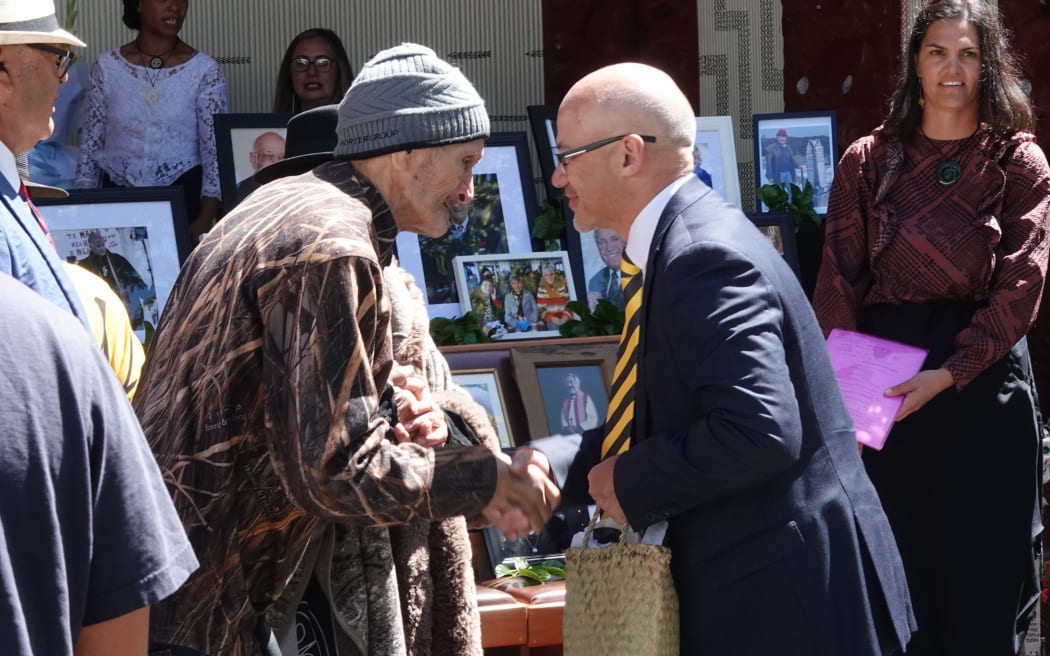
Te Ihutai kaumātua Pai Tahere accepts a copy of the Waitangi Tribunal report, on behalf of Hokianga claimants, from presiding officer Craig Coxhead. Photo: RNZ/ Peter de Graaf
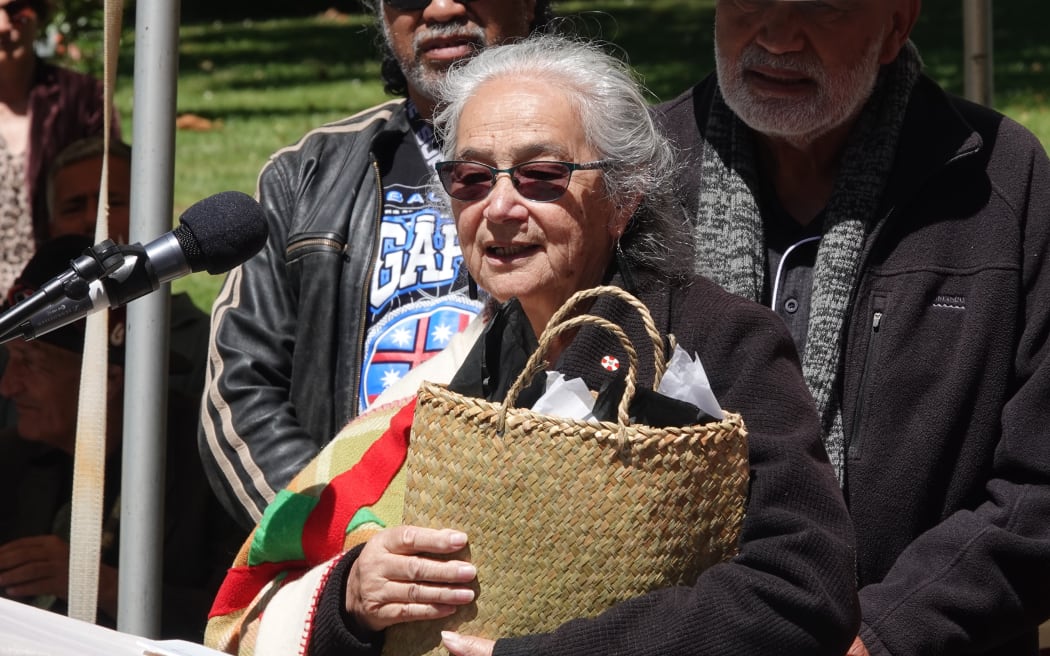
Whangaroa claimant Pat Tauroa, holding the report in a flax kete, challenges tribunal members to give a copy to the new prime minister. Photo: RNZ/ Peter de Graaf
Pat Tauroa, who led the Whangaroa area's claims throughout the inquiry, said it had been a long and trying process, but she was proud of the result.
She used her speech to challenge Tribunal members and the new government.
"I asked the Tribunal, could they please take a copy of the report, place it on the table in front of our incoming prime minister, and require that he read it before he starts rubbishing Māori any more. He's saying that he's going to scrap everything Māori," she said.
Not everyone, however, opposed the new government's approach.
Dover Samuels, a Māori Affairs Minister in Helen Clark's Labour-led government, said past governments had delivered little for Māori, and had in fact widened gaps instead of closing them.
"Nothing is going to change if it's the same old, same old. … It would be incumbent on our people to give this new government a chance to bed in, and deliver policies that would uplift the Māori nation and have them make the appropriate contribution that everybody else does to New Zealand's economic, cultural and social well-being," he said.
About 500 people, from every corner of Northland, attended the ceremony.
Among them was Hori Chapman of Mangamuka, who said the report proved claimants were right when they asserted Māori had not ceded sovereignty.
"It's been quite a major exercise. A lot of money has been expended to prove what we've known all along - that we didn't cede our rangatiratanga."
Chapman said he hoped the Crown was listening.
"But of course they are not bound by the findings of the Tribunal. What we'd like is for them to acknowledge the evidence that has been presented, and to be bound by the findings. To put things right so that we may live in peace on this whenua."
Another common theme among claimants spoken to by RNZ was a new-found sense of unity among Ngāpuhi's famously divided hapū.
Waihoroi Shortland said that was something the government should take note of as hapū prepared to engage in the "to and fro" of settlement negotiations.
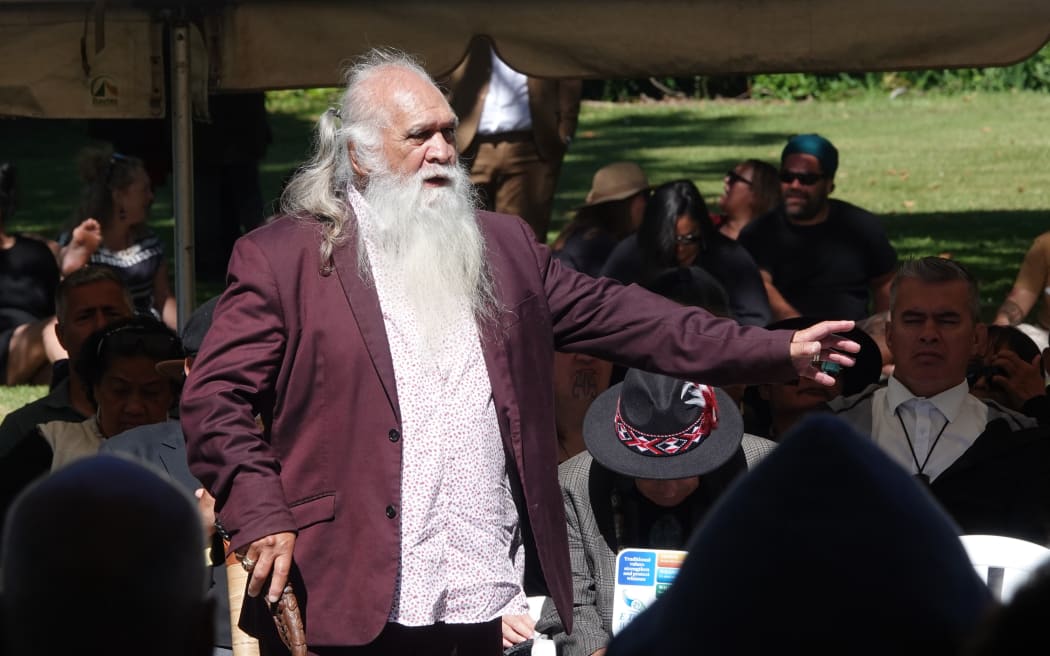
Noted Ngāpuhi academic Hone Sadler addresses the Waitangi Tribunal. Photo: RNZ/ Peter de Graaf
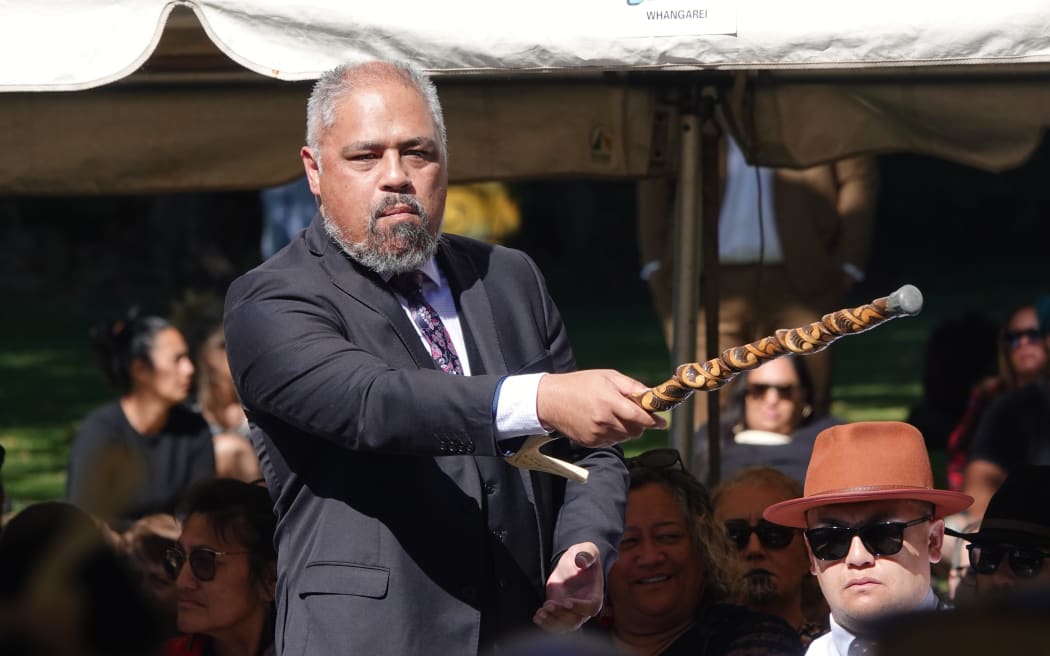
Labour list MP and grandson of Sir James Henare, Peeni Henare, addresses the Tribunal. Photo: RNZ/ Peter de Graaf
Ngāpuhi is the only major iwi which has yet to settle its historic Treaty grievances.
Stage one of Te Paparahi o Te Raki, which was completed in 2014, found the Northern chiefs did not cede sovereignty when they signed Te Tiriti o Waitangi [The Treaty of Waitangi] in 1840.
Part one of stage two examined 415 individual Treaty claims from 1840-1900 across much of Northland. Part two will address claims relating to events after 1900.
